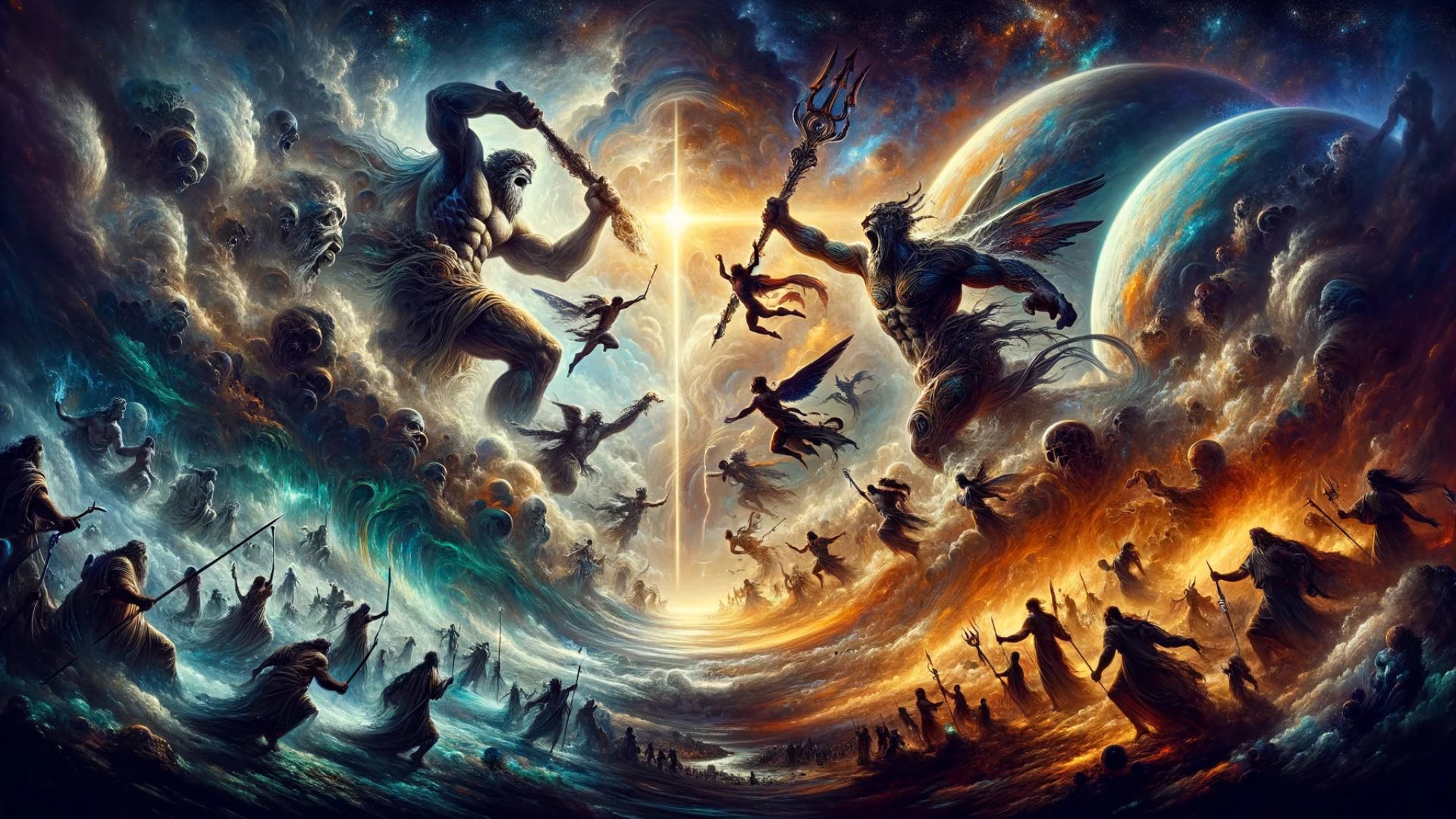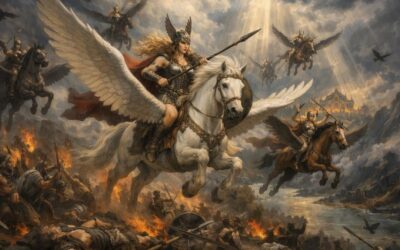Imagine a time when the world was young, and the heavens and earth were ruled by mighty beings. This was the era of the Titanomachy, an epic war in Greek mythology that shaped the cosmos. The Titanomachy wasn’t just a mythical skirmish; it was a clash of generations and ideologies, marking the transition from the old order of the Titans to the new rule of the Olympian gods.
The Spark of Divine Conflict
The Titanomachy finds its roots in betrayal and power struggles. Cronus, the leader of the Titans, overthrew his father Uranus to become the ruler of the universe. However, fearing a prophecy that he would be overthrown by his own children, Cronus swallowed each of them at birth. His wife Rhea, distressed by the loss of her children, tricked Cronus into swallowing a stone instead of their youngest, Zeus. Zeus, thus saved, eventually challenged Cronus, leading to the Titanomachy.
The War of the Ages
The war was a colossal struggle between the Titans, the older generation of deities, and the Olympians, the younger gods led by Zeus. The Olympians were fresh, dynamic, and symbolized new thinking, whereas the Titans represented the old ways. This clash can be seen as a metaphor for the inevitable conflict between the old and the new, tradition and innovation.
- Zeus and His Siblings: Rescuing his siblings from Cronus’ belly, Zeus led them in the battle. Each Olympian god played a crucial role, showcasing their unique powers and strengths.
- The Titans’ Resistance: The Titans, although older and experienced, were ultimately outmatched by the strategic cunning and vigor of the Olympians.
The Aftermath and Its Significance
The defeat of the Titans led to their imprisonment in Tartarus, and the Olympians ascended to power. This victory marked a new era in Greek mythology, with Zeus and his siblings ruling over different aspects of the world and human life.
Real-Life Connections
The Titanomachy, like many myths, resonates with real-life themes. It reflects the natural cycle of change where new ideas and generations come to the forefront, challenging and eventually replacing older ones. This can be seen in everything from political revolutions to technological advancements and cultural shifts.
Embracing Change in Our Lives
The story of the Titanomachy reminds us that change, though often challenging, is a natural and necessary part of life. Embrace the changes you encounter, whether they be in your personal life, career, or society as a whole. Remember, every end marks the beginning of a new era.
As you reflect on this tale of ancient gods and titans, think about your own life. Where can you be more open to new ideas and changes? How can you be an agent of positive change in your community or workplace? Let the story of the Titanomachy inspire you to embrace and lead the new eras in your life.
Why Should You Care?
Learning about the Titanomachy is important because it offers more than just an understanding of ancient Greek mythology. It provides insight into the human condition, reflecting the universal themes of power, change, and the cyclical nature of life. These themes are timeless and relevant, mirroring the transitions and conflicts experienced in our own lives and societies. The story serves as a metaphor for the inevitable shifts from old to new, encouraging us to embrace change and progress.
Key Takeaways
- The Titanomachy was a foundational conflict in Greek mythology between the older Titans and the younger Olympian gods.
- It symbolizes the transition from old to new, representing the cyclical nature of change and power.
- Zeus’s rise to power marked a significant shift in the mythological narrative, emphasizing new ideas and approaches.
- The story resonates with real-life themes, like the conflict between tradition and innovation, and the natural cycle of generational change.
- The Titanomachy encourages an understanding of change as a natural and necessary part of life and history.
Keywords
- Titanomachy: The war in Greek mythology between the Titans and the Olympian gods.
- Greek Mythology: A body of myths and teachings belonging to the ancient Greeks, concerning their gods and heroes.
- Olympian Gods: The younger generation of gods in Greek mythology who overthrew the Titans.
- Titans: The older generation of gods in Greek mythology who preceded the Olympians.
- Zeus: The king of the Olympian gods in Greek mythology.
- Cronus: A Titan who was the father of Zeus and ruler before the Olympians.
- Metaphor: A figure of speech in which a word or phrase is applied to an object or action to which it is not literally applicable.
- Cycle of Change: The concept that change is a constant and cyclical process in life and history.
- Tradition vs. Innovation: The conflict or balance between old methods or ideas and new ways of thinking.
- Power Dynamics: The shifting nature of power and control in relationships, societies, or narratives.
Frequently Asked Questions
Were the Titans considered evil in Greek mythology?
Not inherently. The Titans, like the Olympians, had complex characteristics. The portrayal of Titans as evil often comes from their opposition to the Olympians, who were more directly involved with humanity.
Did any Titans side with the Olympians in the Titanomachy?
Yes, a few Titans, such as Themis and Prometheus, sided with the Olympians, reflecting the nuances in the mythological narrative.
Myth Buster
Myth: The Titanomachy is a simple good vs. evil story.
Reality: The Titanomachy is more complex, symbolizing the natural process of change and the transition of power. It isn’t just a tale of good defeating evil but a metaphor for progress and the cyclical nature of history.
Let’s Talk
- How do you see the themes of the Titanomachy reflected in today’s world?
- Can you think of any modern stories or events that parallel the conflict and themes of the Titanomachy?
- What lessons can we learn from the Titanomachy about handling change and transitions in our lives?
Feel free to share your thoughts in the comments below! Your perspective on how ancient myths like the Titanomachy relate to contemporary life can provide fascinating insights.











0 Comments